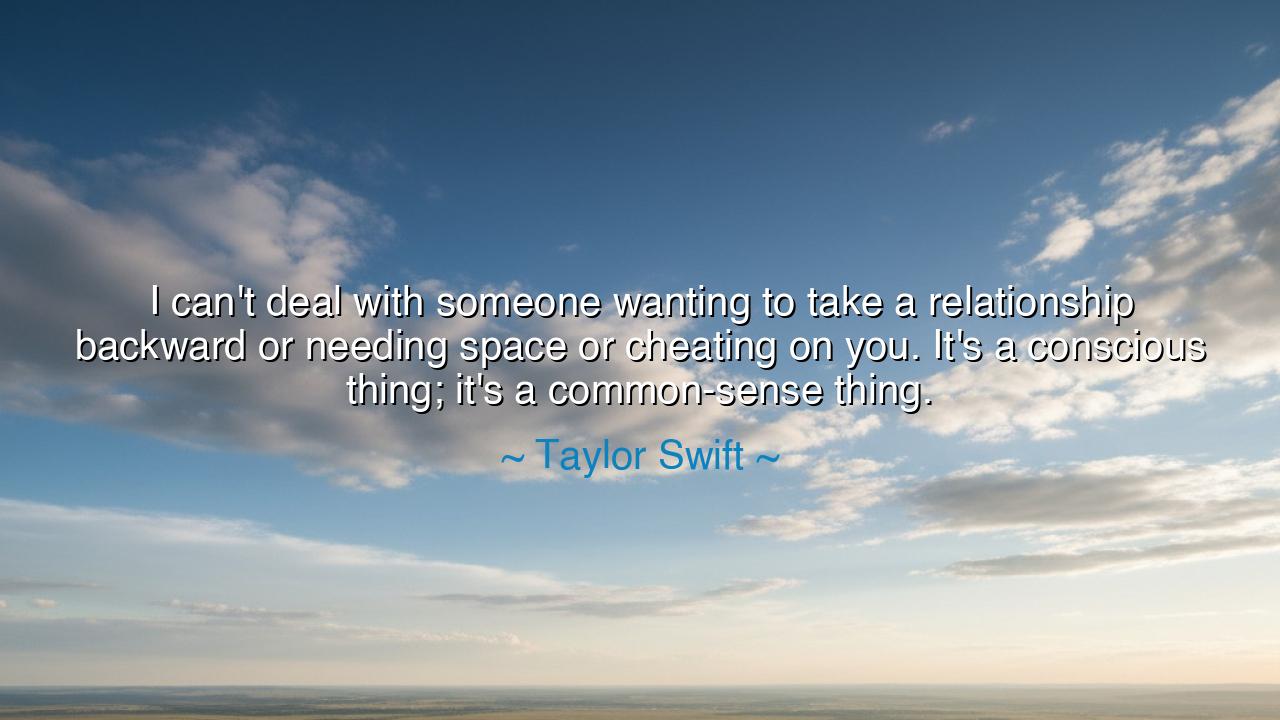
I can't deal with someone wanting to take a relationship backward
I can't deal with someone wanting to take a relationship backward or needing space or cheating on you. It's a conscious thing; it's a common-sense thing.






Hear the resolute words of Taylor Swift, who declared: “I can't deal with someone wanting to take a relationship backward or needing space or cheating on you. It's a conscious thing; it's a common-sense thing.” Though spoken in the language of our day, these words strike with timeless force, for they speak of fidelity, of truth, and of the sacred duty of love. Love, if it is true, must move forward like a river; if it turns backward into betrayal or distance, it ceases to be love. What Swift names common-sense is in truth eternal wisdom: no bond survives without trust, and no heart can endure when deceived.
The origin of this truth lies not only in the songs of heartbreak but in the history of human unions. Since the dawn of time, men and women have pledged themselves to one another, not merely for pleasure but for loyalty, for the building of homes, families, and societies. Yet the temptation to betray, to wander, to wound has always shadowed the path of love. Swift’s words remind us that these choices are not accidents but conscious acts, born of will. To betray is not fate; it is decision. To honor love is not chance; it is the daily work of commitment.
History bears witness to the ruin caused when trust is broken. Consider the tale of Helen of Troy and Paris. Their act of betrayal—cheating love, dishonoring bonds—unleashed the Trojan War, burning cities, and countless deaths. What began as a private betrayal became a public catastrophe. This story, sung by Homer, is proof that the breaking of trust in love does not remain in the shadows; it spreads outward, causing destruction greater than imagined. Betrayal is not only personal—it is social, for it poisons the fabric of human trust.
Yet history also shows the strength of fidelity. Think of Odysseus and Penelope. Though Odysseus wandered for twenty years, facing storms and temptations, Penelope remained steadfast, weaving by day and unweaving by night, holding faith in her absent husband. When he returned, weary and scarred, their love endured because trust had been preserved. Their story reveals the other side of Swift’s truth: where loyalty remains unbroken, love not only survives but triumphs.
Taylor Swift’s words also strike against the notion of regression in relationships. To take a relationship backward is to deny its growth, to retreat from the work of building intimacy. Love is not meant to stagnate or weaken; it must mature, deepen, and expand. When one partner withdraws, seeking distance or indulging betrayal, the other is left bearing a burden too heavy to carry alone. This is why she speaks with finality: such behavior cannot be endured, for it is the death of love itself.
The lesson is clear: love demands conscious choice, not passive drifting. Fidelity, trust, and presence are not optional; they are the pillars of relationship. Do not excuse betrayal as weakness, nor distance as inevitable. To love is to decide—daily, hourly—to remain faithful, to remain present, to move forward together. And to endure love that lacks these choices is to invite ruin upon the soul.
Therefore, O listener, learn from this wisdom. Do not squander your heart on those who cheat, retreat, or regress. Guard your dignity, and remember that loyalty is the true measure of love. If you love, then love wholly, faithfully, and with strength. And if you are betrayed, do not cling to shadows—release them, and walk forward into the light. For as Swift declares, it is not only a matter of passion, but of common-sense: love without loyalty is no love at all.






AAdministratorAdministrator
Welcome, honored guests. Please leave a comment, we will respond soon